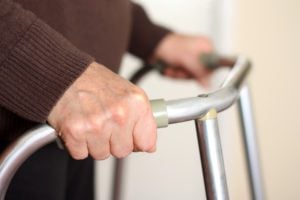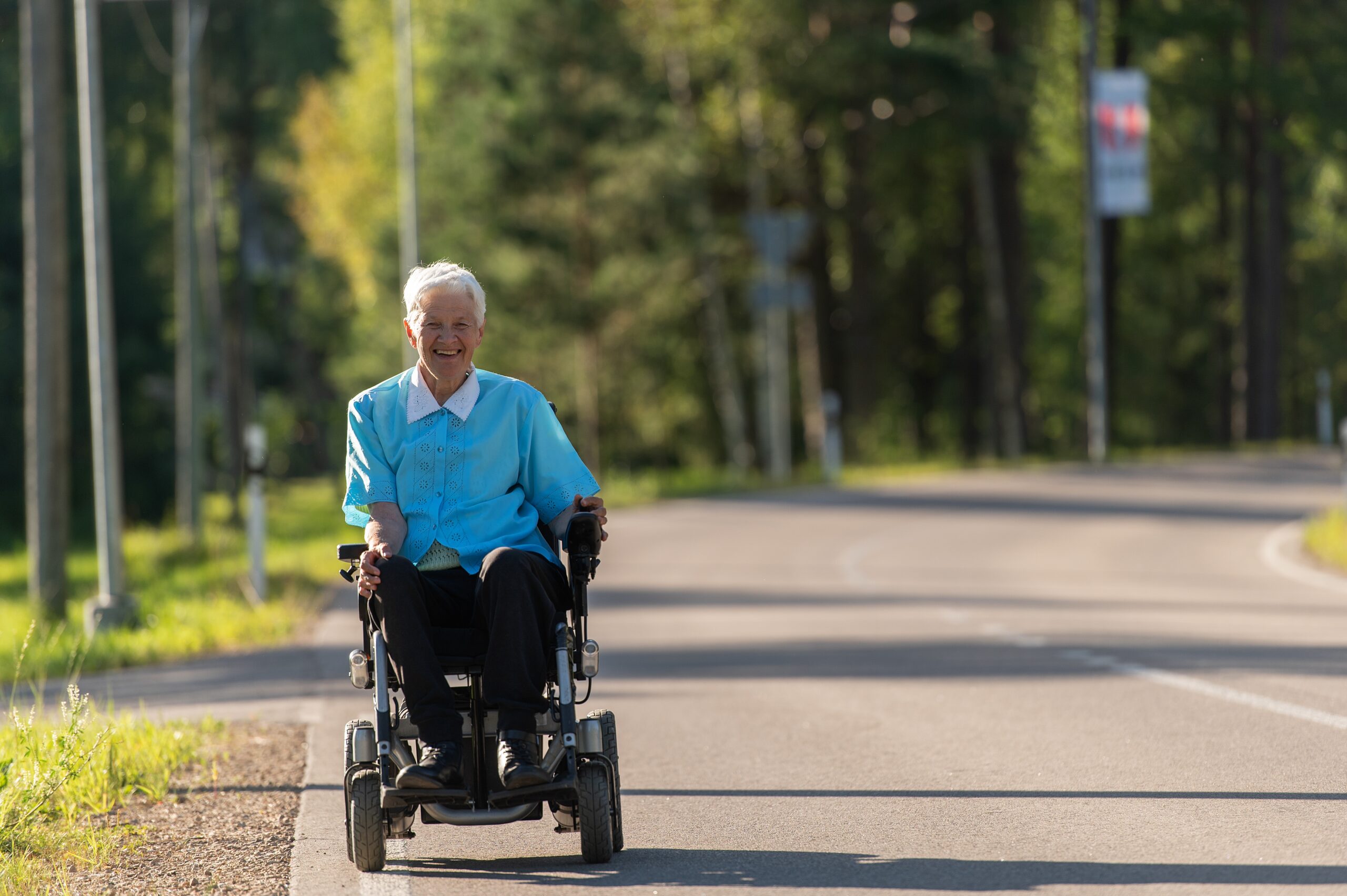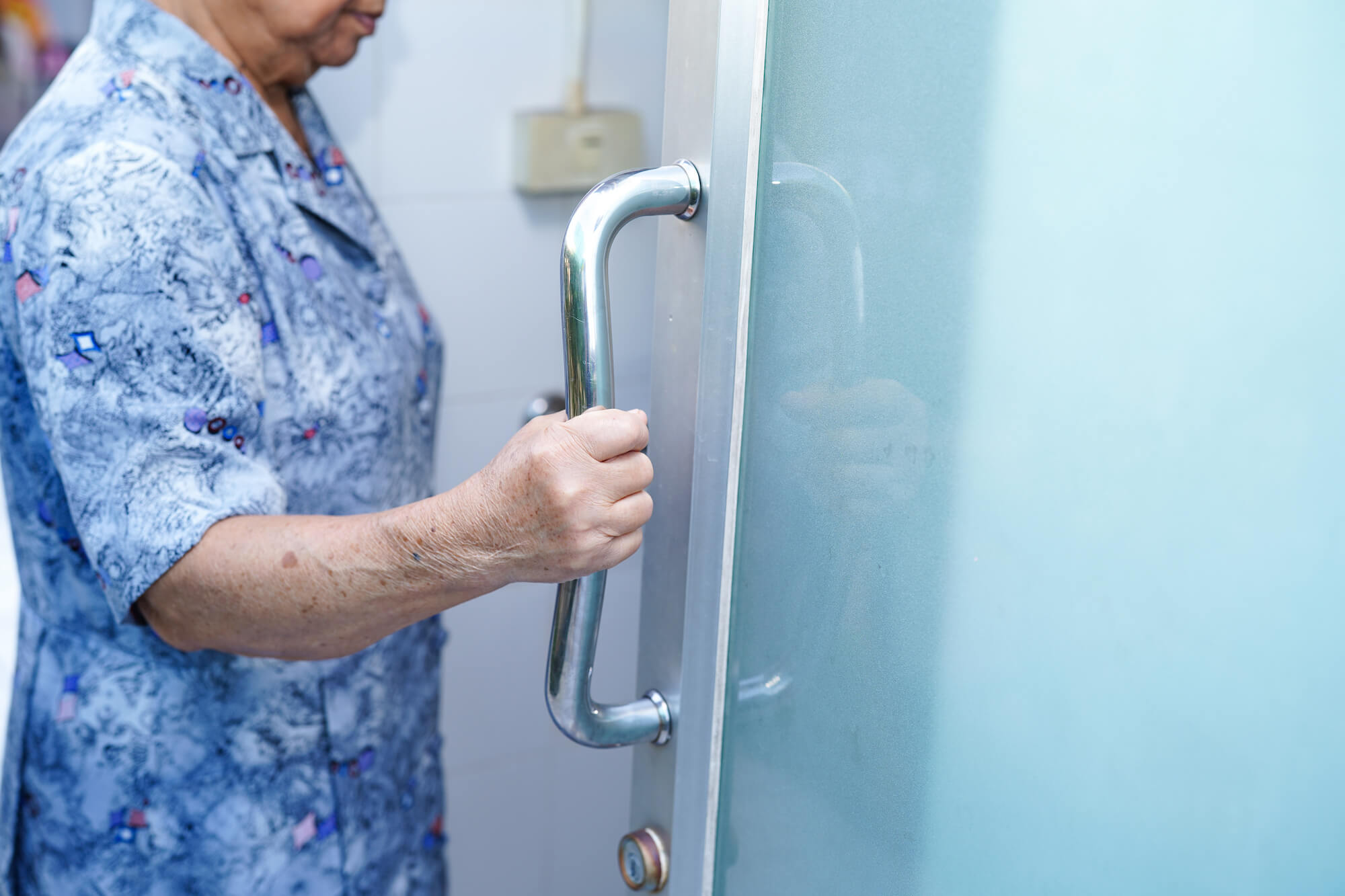Mobility aids for the elderly to improve daily living
Tags
Elderly Mobility and Independence
Statistics show that over 30% of people over the age of 65 experience at least one fall each year, with the likelihood of a fall increasing over time. By 80, that figure rises to 40%, making it a real issue for older adults.
If you or your loved one has already experienced a fall or you’re worried about being a little unsteady on your feet, there is a wide range of mobility aids available to help with everyday tasks in daily life.
Walking stick
A walking stick is a simple and effective method of providing extra support for anyone who experiences problems with balance or walking. Readily available, they come in a wide variety of sizes and designs, making it easy to find one that suits yours or your loved one’s circumstances.
Older people will benefit from a weight-bearing stick made from aluminium or carbon fibre for the highest level of support, with some models offering additional support in the form of a tripod base. Folding walking sticks are ideal for older people who like to get out and about, as they can be easily stored away when not required. You can often borrow a walking stick from the NHS – speak to your GP, occupational therapist or district nurse for more information. You can also buy them from mobility shops, they shouldn’t cost more than £30.
How to measure for a walking stick
A walking stick that’s the wrong height may cause more harm than good. These steps can help ensure a stick is the correct height for you or a loved one.
- Ensure you’re wearing the shoes you walk in most often before being measured
- Stand in a natural position
- Set the stick flat on the floor, ensuring it’s around 15cm from the side of the foot
- Arms should be relaxed by your side, with a very slight bend at the elbow
- If the top of the walking stick is level with your wrist, it’s the right height
Walking frames, trolleys and rollators
Providing more significant support than a walking stick, walking frames are lightweight and sturdy and provide more reliable aids for balance. They come in various designs, with some models being height adjustable, so make sure your loved one tries several models to find the one that best suits their needs.
Walking frames, also known as Zimmer frames, usually have four rubber feet or two rubber feet and two wheels for more natural movement.
While a frame with wheels isn’t intended for the user to lean their full weight on them, they’re often a popular choice for use outside as they’re easier to manoeuvre and don’t require the user to lift them with each step. Some also have a built-in seat, offering additional stability for people who may need to take a break while out and about.
- 4-wheel Rollator walker – has wheels and a brake for greater control. They usually offer a wide range of accessories, such as caddies for holding personal items on the move, and some models also provide a padded seat,
- Trolley walkers – Similar to a 4-wheel, however these are often made for use around the home and feature removable trays for carrying things from room to room.
- Tri-walkers – three-wheeled versions are more compact, making them easier to store or put into the boot of the car.
What do think about when choosing the best walking aid for you or a loved one
- Is it the correct height?
- Is it only for use indoors? If yes, frames without wheels may be more suitable
- Are you or your loved one strong enough to lift a frame without wheels?
- Will it be used for getting out and about? If yes, frames with wheels are best for the outside.
- Is a seat, basket or tray needed?
- Will it need to be folded to put in a car?

Wheelchairs
If a doctor thinks a wheelchair would be appropriate, they should be offered an appointment with their nearest NHS Wheelchair Service centre. In these instances, the wheelchair will be completely free of charge and will be maintained by the NHS.
If you or your loved one would prefer to organise your own wheelchair, a voucher will usually be offered to set against some or all of the cost.
Where the NHS does not consider a wheelchair necessary, it’s still possible to source one through a wide range of providers, with some models folding down for easy transportation.
Electric wheelchairs are also available, so study the range of models on offer before deciding the most appropriate solution for the circumstances. If you’re worried about the cost, it’s worth reaching out to the The Motability Scheme to see if you qualify for support.
When choosing a wheelchair, think about –
- Would a manual wheelchair (one you propel yourself), an attendant-propelled chair (one someone pushes for you) or an electric wheelchair be more suitable?
- What weight of chair do you need – will you be transporting it in a car a lot? Will someone else be pushing it? Remember, most chairs have an upper weight limit they can safely carry too.
- How often will you need to use it to support your quality of life? Will you need it every day, or just to do certain things like short trips or appointments?
- Choose a comfortable seat size – make sure your weight is evenly distributed over the seat. If the seat is too wide, you’ll likely end up leaning to reach the armrests. Too narrow, and you increase the risk of pressure sores.
- Back and armrest height – the right height will ensure your head and neck are supported properly, without the need to hunch.
Mobility scooters
Mobility scooters are a firm favourite for independent living, suited to people who are comfortable getting out and about on their own.
Class 2 mobility scooters
Class 2 mobility scooters are restricted to use on footpaths, pavements, and when crossing roads. Their maximum speed is 4mph (6.4kph).
Some notable characteristics of class 2 scooters include:
- It’s possible to use it indoors.
- The item is small, lightweight, and compact.
- Has basic driving controls
- Some have the ability to be dismantled or folded up to fit into a car boot easily.
- They have a shorter battery life than other scooters, which results in shorter travel distances.
Class 3 mobility scooters
Class 3 mobility scooters are permitted for use on both roads and pavements, with a maximum speed limit of 4mph on pavements and 8mph (12.8kph) on roads.
Some key features of class 3 scooters include:
- Suitable for use outdoors.
- Sturdy and long life
- The vehicle is equipped with necessary features like a rear-view mirror, reflectors, and additional controls for driving on roads, including indicators, headlights, a horn, and hazard lights.
- They require a ramp or lift to get them into a vehicle
- The combination of longer battery life and tougher tires enables them to travel longer distances.
Because they’re classed as disability vehicles, there’s no road tax to pay. However, it’s advisable to take out an insurance policy with a minimum of third-party coverage to cover the user in the event of an accident, although this is not a legal requirement.
Scooters and wheelchairs can easily be hired from organisations such as Motability shop and the Red cross if they’re only expected to be needed for a short period. This can also be an excellent way of discovering whether they’re an appropriate long-term solution.
Living long and well – the role of physiotherapy in later life
As CEO of The Chartered Society of Physiotherapy, Karen Middleton is passionate about the role physiotherapy has to play in enabling people to live long and live well. We talked to her about how crucial it is to stay active for optimum health and life experienceStairlifts
A stair-lift can offer real benefits where stairs are an issue, allowing people with mobility issues to move about their own homes safely. Stairlifts come in a variety of styles and designs and can be fitted to most stairways, even where they have many twists and turns.
Straight stairlifts.
The straight stairlift is the most common type. It consists of a chair and track that are fitted to the stairs, rather than the wall. It’s easy to install, doesn’t clash with home decor, and is usually the cheapest option.
This stairlift can help people with mobility difficulties, including those with joint pain, disabilities, or conditions like multiple sclerosis or osteoarthritis.
Consider installing a straight stairlift for a mostly straight staircase with a curved section at the top or bottom.
Curved Stairlifts
Curved stairlifts are specifically made for people with disabilities to navigate spiral or cornered staircases easily. The chair remains the same, but the track is curved, allowing for a smooth ride over turns like 90° and 180°.
A straight stairlift may not be a long-term solution because health conditions can worsen. Consider getting a curved stairlift that covers the entire staircase to be prepared for any situation.
Slim, standing or perch stairlifts
Slim, standing or perch stairlifts are designed based on straight or curved tracks. Standing or perch stairlifts allow users to travel up the stairs while standing, which is beneficial for those with aching or painful joints at the knee or hip.
The perch stairlift is for those who find sitting uncomfortable but can’t stand for long. It has a small perch seat below the bottom for support while travelling in a standing position. It’s good for small, narrow staircases where a seated stairlift won’t work. A standing stairlift has similar safety features but no perch seat.
The slim stairlift is a great option for narrow staircases, providing comfort and support for aching joints.

Bathroom aids
Bathrooms are particularly hazardous places for older adults, thanks to the combination of hard surfaces, soap and water, which all contribute to the likelihood of accidents for anyone who is not secure on their feet.
There are a range of bath safety aids available that can help to make bathrooms a safer environment, such as bath grab rails, grip handles, walk-in baths, and bath benches or shower seats. Whatever additional stability you or a loved one needs, there are a range of bathroom mobility aids that will make life easier over time.
In many cases, removing baths and creating a ‘wet room’ can be a helpful long-term solution, enabling easier use of the bathroom facilities for your loved one.
Can I get mobility aids for free?
Aids and equipment come in different sizes and have varying costs.
The Living Made Easy website provides information about the different types of equipment available, the costs, and where to purchase them.
Your council can provide assistance
The local council provides a service for assessing homes and offering equipment or adaptations free of charge. Social services will provide a home assessment to find out what aids, equipment, and other essential items are most suitable. A social care home assessment can also determine home adaptations that could enhance daily living.
You can find information on applying for equipment for your home if you’re disabled on GOV.UK.
Are there mobility aid grants available?
There are several sources of grants and funding for mobility aids, including government grants and aid from charities and organisations. It’s important to note that not everyone will qualify for certain types of financial assistance, and receiving a stairlift grant is not guaranteed, even if you require one. Below is a list of available grants to assist with the cost of a stairlift.
- The Disabled Facilities Grant
- Independence At Home
- Margaret’s Fund – For Women
- SSAFA – For people who have had at least a day’s pay from the Armed Forces or in the immediate family of someone who has served
- Royal Agricultural Benevolent Institution – Support for people working in or formerly in agriculture
Hiring or loaning equipment
You may consider renting equipment to test it out before purchasing it, if you only need it temporarily or need it for travel purposes. There are many companies, such as Direct Mobility, to hire equipment from. To find the best local company for you, search for ‘specialist disability equipment hire’ or ‘local disability equipment suppliers’ into your search engine.
You can also hire a commode, toilet seat or toilet frame from the Red Cross.
Read more care guides

How to prepare for a live-in caregiver
Care at home: how to prepare the home for a live-in caregiver A live-in carer can make a massive difference to your loved one’s quality

6 tips for finding the right live-in carer
Finding the right live-in carer is a significant and deeply personal decision, impacting your loved one and the entire family. You’re seeking someone trustworthy, compassionate,

The cost of care – everything you need to know
The true cost of care – everything you need to know Discover the true cost of care and explore your funding options with our care

Understanding autism in older adults
While Autism is usually diagnosed in childhood, an increasing number of older adults are being formally diagnosed in later life. Masking autism symptoms can result

A guide to speaking with a loved one about home care
Why do older adults resist care? A guide to speaking with a loved one about home care Bringing up the topic of care at home

How to choose the right personal alarm for seniors: A comprehensive guide
Personal alarms for elderly Discover how personal alarms work, who they’re best suited to, and how they provide greater peace of mind to older people